最新Unit-12-What-did-you-do-last-weekend-教案 (1)
Unit12-教案What-did-you-do-last-weekend
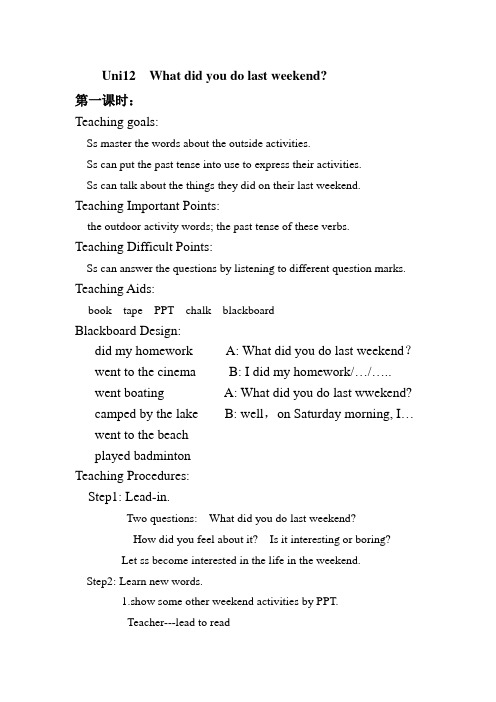
Uni12 What did you do last weekend?第一课时:Teaching goals:Ss master the words about the outside activities.Ss can put the past tense into use to express their activities.Ss can talk about the things they did on their last weekend. Teaching Important Points:the outdoor activity words; the past tense of these verbs. Teaching Difficult Points:Ss can answer the questions by listening to different question marks. Teaching Aids:book tape PPT chalk blackboardBlackboard Design:did my homework A: What did you do last weekend?went to the cinema B: I did my homework/…/…..went boating A: What did you do last wwekend?camped by the lake B: well,on Saturday morning, I…went to the beachplayed badmintonTeaching Procedures:Step1: Lead-in.Two questions: What did you do last weekend?How did you feel about it? Is it interesting or boring?Let ss become interested in the life in the weekend.Step2: Learn new words.1.show some other weekend activities by PPT.Teacher---lead to readStudents-----read in a rowPay more attention to camp by the lake and go to the cinema.The right---the present tense left—the past tense2. exercises about these words.Finish 1a, Match the phrases with the pictures.Pair check------class checkStep3: Do the listening11.Listen and write the day, morning, afternoon or night beloweach picture.2. Listen and repeat.3. Role-play Girls: A Boys: BA: What did you do last weekend?B: Well, on Saturday morning, I played badminton…….4. circle the marking of different times, know that when thesetime words accur, we should use the simple past tense.Step3: Do the listening21.Listen and underline the words you hear(class check answers)2.Listen again, write C for Carol, J for Jack, B for Becky nextto the statement in 2a.3.Listen and repeat.Step4: post-listening1.Ask and answer(pair work)A: Who visited her Grandma?B: Becky did.A: What did jack study for?B: He studied for the English test.A: where did Carol go?B: She went to a farm.Ask some questions who, what or where, another student answers. Step5:HomeworkPredict the grammar focus and finish exercises. Refection:在2c 的对话语言的输出时,教师应就who, what 和where 的三个问句做出范例,让学生能够明确这一步的目的与重点,之后再让学生根据要求进行对话输出,这样一方面是对所学知识的运用,一方面是对grammar focus 重点知识点的铺垫,效果应该会更好一点。
Unit-12-What-did-you-do-last-weekend?知识强化

Unit 12 What did you do last weekend?知识强化一、知识概述1.学习和掌握本单元出现的生单词、词组和句型。
2.继续学习和巩固动词的一般过去时用法。
3.学习一般过去时的特殊疑问句用法。
二、语音知识:Listen and read. Notice the change in the past forms.三、单元重难点解析1.词汇篇:do my homework——went to the cinemago boating——camped by the lakego to the beach——played badmintonsing and play the guitar——went to the libraryswim in a swimming pool——studied for a testhave dinner with friends——flew a kitesit under the moon——told each other storiesgo to sleep—2.What did you do last weekend, Lucy?露西,上周末你做了什么?这个句子是谓语动词是实义动词的一般过去时的特殊疑问句用法。
特殊疑问词+did+主语+动词原形+其它?e.g.What did you do last night?昨天晚上你做了什么?Where did he go last Sunday?上个星期天他去哪儿了?Who did she go with?她和谁一起去的?注意:(1)当特殊疑问词是充当主语时,则不需要使用助动词did,直接用特殊疑问词加动词的过去式来表达就可以了。
e.g.Who visited her grandma?谁拜访了她的奶奶?(2)当句子的谓语动词是be动词was/were时,特殊疑问句的结构为“特殊疑问词+ was/were +其它?”e.g.How was your weekend?你周末过得如何?How was the weather in Beijing?那时候北京天气如何?3.How interesting! [译文]多么有趣啊!这是个感叹句。
Unit_12_What_did_you_do_last_weekend

Read the conversation and answer
2d
the questions.
1. How was Lisa’s weekend? It was great. ______________________
2. Where did Lisa work as a guide? At the Natural History Museum. _____________________________
I went to the library.
I cleaned my room.
What did she do last weekend?
she did homework
What did they do last weekend?
They went to the cinema
What did she do last weekend?
3. What did she do there?
_____________________________ She told the visitors about the _____________________________ butterflies and their living habits. 4. Why is Paul tired now? Because he stayed up late to watch _____________________________ the soccer game. _____________________________
2. How interesting! 多么有趣啊! 这是一个感叹句,句子结构为: How + 形容词或副词 + (主语 + 谓 语)!
人教版新目标七年级下学期Unit-12--what-did-you-do-last-weekend--知识点

Unit 12 what did you do last weekend?Section A 知识讲解一. last(1)last形容词“最后的,最末的”或者“紧接前面的,刚过去的”。
Today is the last day in the year.最后一天。
I didn’t sleep well last night. 昨晚(2)last副词,“最后地”,I’m the last one.最后一个。
(3)last 动词,“持续,继续,维持”等,The hot weather lasted a week.持续了一周。
二. camp(1)camp 动词,“扎营,搭帐篷”。
We go camping every summer.We walked all day and camped by a river at night.(2)camp 名词,“露营地,度假营”。
Let’s go back to the camp, it’s getting dark. 让我们回营地吧,天黑下来了。
根据汉语提示填空。
(1)When did you join the ______ ______ (夏令营)?(2)I like ______ ______ (去宿营)in the open air.3)We______(宿营)in the forest last night. (4)Let’s go back to the ______(营地)三. sheepsheep 可数名词,“绵羊”,复数还是sheep;goat指山羊。
How many sheep are there on your farm? 你们农场里有多少只羊?拓展:常见的单复数同形的名词还有:deer (鹿),fish (鱼),Chinese (中国人),Japanese(日本人)等。
四. byby介词, “在……旁边”,相当于beside。
Our teacher is sitting by the window.by与交通工具名词连用时,名词前不用冠词,意为“乘、坐、用”等。
人教版七年级英语下Unit12-What-did-you-do-last-weekend单元试卷及答案
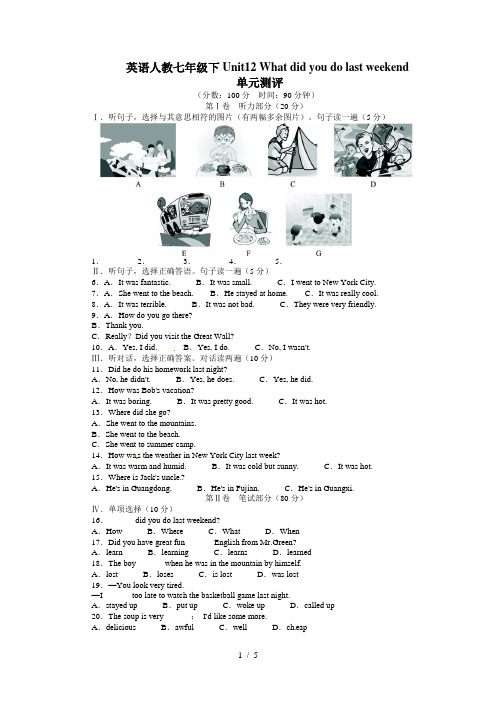
英语人教七年级下Unit12 What did you do last weekend单元测评(分数:100分时间:90分钟)第Ⅰ卷听力部分(20分)Ⅰ.听句子,选择与其意思相符的图片(有两幅多余图片)。
句子读一遍(5分)1.______2.______3.______4.______5.______Ⅱ.听句子,选择正确答语。
句子读一遍(5分)6.A.It was fantastic. B.It was small. C.I went to New York City. 7.A.She went to the beach. B.He stayed at home. C.It was really cool. 8.A.It was terrible. B.It was not bad. C.They were very friendly. 9.A.How do you go there?B.Thank you.C.Really?Did you visit the Great Wall?10.A.Yes, I did. B.Yes, I do. C.No, I wasn't.Ⅲ.听对话,选择正确答案。
对话读两遍(10分)11.Did he do his homework last night?A.No, he didn't. B.Yes, he does. C.Yes, he did.12.How was Bob's vacation?A.It was boring. B.It was pretty good. C.It was hot.13.Where did she go?A.She went to the mountains.B.She went to the beach.C.She went to summer camp.14.How wa s the weather in New York City last week?A.It was warm and humid. B.It was cold but sunny. C.It was hot. 15.Where is Jack's uncle?A.He's in Guangdong. B.He's in Fujian. C.He's in Guangxi.第Ⅱ卷笔试部分(80分)Ⅳ.单项选择(10分)16.______ did you do last weekend?A.How B.Where C.What D.When17.Did you have great fun ______ English from Mr.Green?A.learn B.learning C.learns D.learned18.The boy ______ when he was in the mountain by himself.A.lost B.loses C.is lost D.was lost19.—You look very tired.—I ______ too late to watch the basketball game last night.A.stayed up B.put up C.woke up D.called up20.The soup is very ______;I'd like some more.A.delicious B.awful C.well D.ch eap21.—Who cleaned the classroom?—Bob ______.A.does B.did C.cleaned D.was22.—______ was your weekend?—It ______ really relaxing.A.How;was B.What;were C.What;was D.How;were23.We all know that snakes have no ______.A.eyes B.mouths C.teeth D.ears24.I saw a cat ______ with a ball in the living room.A.play B.played C.plays D.playing25.The weather was terrible,and it ______ me ______ sad.A.make;feel B.made;feel C.made;felt D.makes;feelⅤ.完形填空(10分)Last Sunday we had a great trip.My father, my mother and I __26__ to summer camp.We went to a mountain.First we __27__ to the foot of the mountain __28__ bus.In the middle of the mountain there was a river.The water was clean and clear.I washed my face __29__ the water.It was warm.There __30__ some fish in the river.In the mountain there were flowers.They were __31__.At noon, many people got together, and they were very __32__.We made our meal in the mountain.The food was v ery __33__,and we liked it very much.After meal, we went on our trip.We felt __34__.It was really __35__.26.A.go B.goes C.went D.going27.A.get B.got C.got to D.arrived28.A.by B.on C.in D.took29.A.on B.with C.for D.into30.A.is B.was C.were D.are31.A.ugly B.beautiful C.awful D.delicious32.A.friendly B.friends C.busy D.tired33.A.nice B.terrible C.bad D.worse34.A.happy B.unhappy C.friendly D.unpleasant35.A.cold B.hot C.fun D.sadⅥ.阅读理解(30分)AMost American families like to have vacation in summer.Summer is a good season for v acation.It is often hot in July and August.Children do not go to school in those two months.Some like to stay at home, read books, stay with their families or watch TV.Many families take their lunch to eat at a place with many trees or near a nice lake.Some people have enough time and money to travel(旅行)to other countries like France, Japan and Australia.They usually fly to these countries.Many families travel by car or train to see interesting places in their own countries.Their favorite cities are New York, Chicago, Miami, San Francisco and Los Angeles.Not everyone likes to go to busy cities.Some families travel to mountains or beautiful valleys(山谷).36.According to the passage,______ is a good season for vacation.A.spring B.summer C.autumn D.winter37.Some children like to stay at home during their vacation.They don't ______.A.read books B.stay with their familiesC.watch TV D.go to school38.Many families like to have their lunch ______ during their vacation.A.in the office B.near a cinemaC.near a big factory D.near a nice lake39.If you have ______,you can travel to other countries.A.money and friends B.friends and timeC.money and time D.food40.Which of the following is “芝加哥” ?A.Chicago. B.New York. C.Miami. D.Los Angeles.BDear Jane,After I left Paris I spent two days in New York City and one day in Washington D.C.I got to Miami, Florida on Nov.13.The weather is wonderful here.Thismorning I went swimming and then slept on the beach.When I woke up, I foundJennifer Lopez—my favorite movie star.She was just on my right!I asked her totake a picture with me.You know, that was my dream.She agreed!I'm going to showyou!John Dear Dad,I got here at last after 18 hours on a train!It's very cold here in Moscow.It'swhite everywhere.This afternoon I went to have a look at the city.I got lost.I amglad I took Russian lessons in my university.They helped me a lot.A young girlshowed me the way back to my hotel.I think I can finish my work here and go backhome soon.I'm looking forward to the warm sunshine at home.See you soon.Max Dear Amy,I arrived in Guilin yesterday.What a beautiful place!The people here are kindand I have some new friends.Guess who I met here!Tom, my high schoolclassmate.How small the world is!He is working here as an English teacher at amiddle school.He showed me around the city.I also went to his school.His studentslike him very much.I bought a special bag made in Guilin for you and a silk tablecloth for mom.Tomorrow evening I'm going to fly to Beijing.Love,Maria 41.Each of the three had a good time.42.Maria went to see her classmate in Guilin.43.It was warmer in Max's hometown(家乡)than in Moscow.44.John was very glad that his dream of going to the beach came true.45.Max speaks a little Russian.CBob's weekendAre you often free on weekends? Bob had a busy weekend last week.(1)On Saturday morning,he went to visit his grandmother with his parents. His grandmother lives in a beautiful village.There Bob went to the mountains with his cousin.After dinner,he went shopping at Haorizi Supermarket.In the evening,he saw an interesting comedy.On Sunday morning,Bob wanted to play soccer,but(2)_it_was_rained_very_hard,so he had to stay at home.He wanted to play the guitar,but he couldn't find his guitar.So he did some reading and watched TV.In the afternoon,(3)他帮助妈妈做家务,然后和爸爸下象棋。
Unit-12-What-did-you-do-last-weekend导学案

Unit 12 What did you do last weekend?第一课时【学习目标】【学习重点】:进一步学习过去时态的用法;学会谈论过去事件。
-- What did you do last weekend?-- Well, on Saturday morning, I played badminton.【体验学习】:I、预习交流1.根据单元标题和图片等,预测新课内容;2.根据音标拼读单词并牢记;3.自学课文,勾画出重点和疑惑。
II、翻译官1. 做作业__________________2. 去海滩______________________ 4. go boating________________ 5. 打羽毛球____________________3. 去电影院________________ 6. camp by the lake_______________【课堂导学】:I、新课呈现1.小组对话What did you do last weekend?2学习1a 的短语,编对话-- What did you do last weekend?-- Well, on Saturday morning, I played badminton.3.听录音1b. Check the answers.II、合作交流Group work: 尝试用一般过去时造句+ 表过去的时间状语。
Notes:_________________________________________________________ _________________________________________________________【自主检测】:I、时态大考验((写出下列动词的过去式))1. camp____________2.work_______________3. feed_______________4. play ____________5.stay _____________6. study ______________7. tell _____________ 8. lose _______________ 9. hear_______________10. run ____________ 11.shout______________ 12. answer_____________ 【学习体会】成功&收获: 失败&不足:Unit 12 What did you do last weekend?第二课时Section A 2a — 2d (P68)【学习目标】【学习重点】:继续学习谈论过去事件;学会用疑问词who, what, when。
Unit-12-What-did-you-do-last-weekend-教案
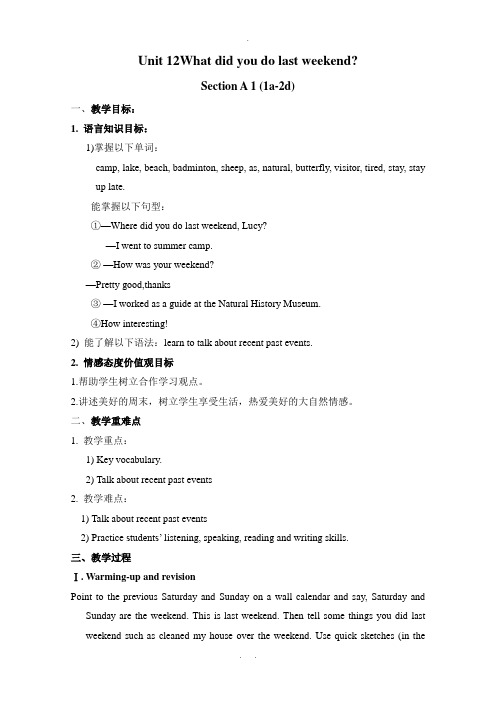
Unit 12What did you do last weekend?Section A 1 (1a-2d)一、教学目标:1. 语言知识目标:1)掌握以下单词:camp, lake, beach, badminton, sheep, as, natural, butterfly, visitor, tired, stay, stay up late.能掌握以下句型:①—Where did you do last weekend, Lucy?—I went to summer camp.②—How was your weekend?—Pretty good,thanks③—I worked as a guide at the Natural History Museum.④How interesting!2) 能了解以下语法:learn to talk about recent past events.2. 情感态度价值观目标1.帮助学生树立合作学习观点。
2.讲述美好的周末,树立学生享受生活,热爱美好的大自然情感。
二、教学重难点1. 教学重点:1) Key vocabulary.2) Talk about recent past events2. 教学难点:1) Talk about recent past events2) Practice students’ listening, speaking, reading and writing skills.三、教学过程Ⅰ. Warming-up and revisionPoint to the previous Saturday and Sunday on a wall calendar and say, Saturday and Sunday are the weekend. This is last weekend. Then tell some things you did last weekend such as cleaned my house over the weekend. Use quick sketches (in theboard along with gestures to demonstrate the meaning of each activity,Ⅱ.1 a This activity introduces the key vocabulary.Focus attention on the picture. Ask students to tell what they see. Name each activity and ask students to repeat:did my homework, went to the cinema, went boating, camped by the lake, went to the beach,played badminton.Point out the numbered list of activities. Say each one again and ask students to repeat.Then ask students to match each activity with one of the pictures. Say, Write the letter of each activity next to the words. Point out the sample answer.Check the answers.Ⅲ. ListeningWork on 1bThis activity gives students practice in understanding the target language in spoken conversation.Point to the activities in the picture in activity la. Ask students to tell what the person did in each picture. For example, she played badminton, or Lucy went to the cinema. Play the recording the first time. Students only listen.Play the recording a second time. This time say. Listen to the recording and write the days and times Lucy did each thing under the pictures. Point out the sample answer under the picture of Lucy playing badminton; on Saturday morning.Correct the answers.Ⅳ. PairworkWork on 1cThis activity provides guided oral practice using the target language.Point to the example conversation. Ask two students to read the dialogue to the class.Say, now work with a partner. Student A, pretend to be Lucy. Student B, ask questions about what Lucy did on different days and times over the weekend.Talk about the activities in the picture.Students work in pairs. As they talk, move around the room monitoring their work.Offer language or pronunciation support as needed,Ⅴ. ListeningWork on 2a:This activity gives students practice in understanding the key vocabulary in spoken conversation.Point to the five sentences and ask a student to read these sentences to the class.Say, You will hear recording of a conversation. The people will talk about some of the activities and people, but they will not talk about others. Please underline the words you hear on the recording.Play the recording the first time. Students only listen.Play the recording a second time. This time, ask students to underline each word that is said on the tape. Point out the sample answer, grandmother.Correct the answers.1grandma 2 homework 3 English 4 farm 5 cowsⅥ. ListeningWork on 2b:This activity provides listening practice using the target language.Call attention to the pictures of Carol, Becky, and Jack and ask students to identify each person by name.Say, Now I will play the recording again. Listen to the students talking about what they did over the weekend. Write C for Carol, B for B Becky or J for Jack next to each statement in activity 2a. The first one has been done for you.Play the recording the first time. Students only listen.Point out the sample answer, S, in statement 1. Say, Sonia visited her grandmother.Play the recording again. Ask students to write a letter in front of each statement to show what each person did.Check the answers. B B C J JⅦ. Pair workAsk and answer in pairs.Point to the example conversation. Ask two students to read the dialogue to the class.Say, Now work with a partner. Student A, ask questions about what,who or where, Student B answers. Students work in pairs.Ⅷ.Role-play the conversation.1. Ask Ss to look at conversation in 2d. Then Ss read the dialogue by themselves andfind the answer to these questions:① What did Lisa do on her weekend?② What did Paul do on his weekend?2. Ss work in pairs and role-play the conversations.3. Have several pairs perform their conversations for the rest of the class.Homework:1. Copy new words twice.2. Write about what you did last weekend.板书设计:Section A 2 (Grammar Focus-3c)一、教学目标:1. 语言知识目标:1) 掌握以下单词:away, mouse, baby, shout ,shout at, woof, language.2) 继续练习一般过去时态能掌握以下句型:—What did you do last weekend?—I did my homework.—Who visited her grandma?—Becky did.—Where did she go last weekend?—She went to a farm.—Who did she go with?—She went with her classmates.2. 情感态度价值观目标:1.提高学生独立学习能力。
unit_12_What_did_you_do_last_weekend?词句精讲精练
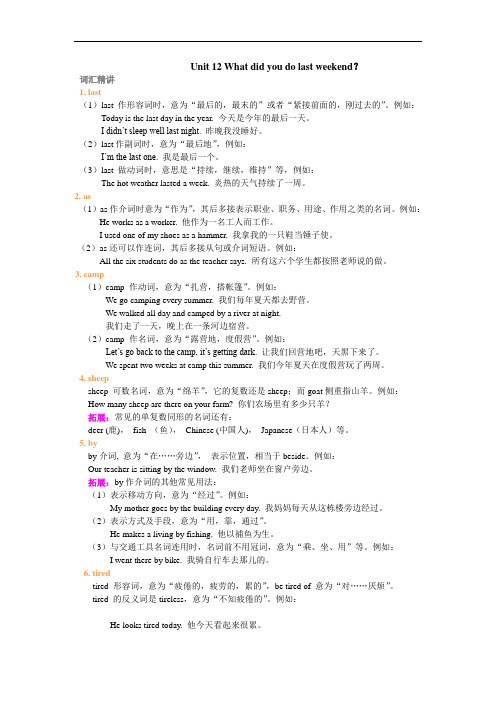
Unit 12 What did you do last weekend?词汇精讲1. last(1)last 作形容词时,意为“最后的,最末的”或者“紧接前面的,刚过去的”。
例如:Today is the last day in the year. 今天是今年的最后一天。
I didn’t sleep well last night. 昨晚我没睡好。
(2)last作副词时,意为“最后地”,例如:I’m the last one. 我是最后一个。
(3)last 做动词时,意思是“持续,继续,维持”等,例如:The hot weather lasted a week. 炎热的天气持续了一周。
2. as(1)as作介词时意为“作为”,其后多接表示职业、职务、用途、作用之类的名词。
例如:He works as a worker. 他作为一名工人而工作。
I used one of my shoes as a hammer. 我拿我的一只鞋当锤子使。
(2)as还可以作连词,其后多接从句或介词短语。
例如:All the six students do as the teacher says. 所有这六个学生都按照老师说的做。
3. camp(1)camp 作动词,意为“扎营,搭帐篷”。
例如:We go camping every summer. 我们每年夏天都去野营。
We walked all day and camped by a river at night.我们走了一天,晚上在一条河边宿营。
(2)camp 作名词,意为“露营地,度假营”。
例如:Let’s go back to the camp, it’s getting dark. 让我们回营地吧,天黑下来了。
We spent two weeks at camp this summer. 我们今年夏天在度假营玩了两周。
4. sheepsheep 可数名词,意为“绵羊”,它的复数还是sheep;而goat侧重指山羊。
人教版七年级下册英语Unit12What-did-you-do-last-weekend?知识点总结

七下Unit 12 What did you do last weekend?一、Important Phrases:1.go to the cinema 去影院★=go to the movies2.go boating/camping 去划船/野营★summer camp 夏令营3.camp by the lake 在湖边野营★by the pool在池边4.go to the beach 去海滩★on the beach 在沙滩上5.play badminton 打羽毛球play+球类/棋类名词(不加冠词)6. study for the test 备考★test=exam7.feed some sheep/cows喂羊/牛★feed(fed)on...以..为食,feed with...用...喂养8. work as a guide 做导游工作★work as +职业从事某工作9. at the Natural History Museum 自然历史博物馆★nature(n.不可数)大自然-natural(adj.)自然的10. over 200 kinds of butterflies 200多种蝴蝶★over=more than 超过11.living habits 生活习惯★make a living 谋生;eating habits饮食习惯12.kind of tired 有点累★kind of = a little13. stay up late 熬夜★stay at home 待在家,stay away from 远离,lately(adv.)最近地14.sleep early 早睡★sleepy 困的,asleep睡着的15.a family of mice 老鼠一家★mouse(单)-mice(复)16.be afraid of sth./to do 害怕★afraid=scared17.run away 跑开★take away 带走,put...away 把某物收拾好,give away 捐赠18. climb onto one’s back 爬上某人的背19. shout at/to sb.冲某人大叫★shout out 大喊出20. a second language 第二语言★mother tongue 母语21.fly a kite放风筝22.do something interesting 做有趣的事★修饰不定代词,adj.后置:anything special23.finish high school 中学毕业★finish doing sth 完成做某事24.a special gift一特殊礼物★gift=present25.take us to India 带我们去印度26.take a long bus ride 坐很久的公交车27.put up our tents 搭帐篷★put up:搭建,举起,张贴28.make a fire生火29.cook food on the fire 在火上做饭★on an open fire 明火,篝火30.tell cach other stories 互相讲故事★tell a lie 说谎,tell a joke 讲笑话31.keep sb.warm 使某人保持暖和32.sit under the moon 坐在月光下★moonlight月光,moon cake月饼33.so.......that.......如此...以致于...34.get a surprise 吃惊35. look out of...向外看★look out 小心,look for寻找,look after 照顾36. jump up and down 跳上跳下37. move into the forest 进入森林38. wake sb up叫醒某人★wake up醒来,awake醒着的39. read a book about history 读一本历史书★read...to sb给某人读...40.see an interesting talk show 看有趣的脱口秀二、Key Language Points:1.Where did you go last weekend? What did you do last weekend?上周末你去了哪里?上周末你做了什么?一般过去时的特殊疑问句:1)特殊疑问词+did+主语+v.(原)+其他?如疑问词作主语,则陈述语序,如:Who bought you this new dress?谁给你买的新裙子?2)特殊疑问词+was/were+主语+其他?Where were you last night?昨晚你在哪里?2.----Who visited her grandma? -----Becky did.为避免重复,常用do,does,did,so等代替前文提到的内容。
Unit-12-What-did-you-do-last-weekend--教学设计-教案 (1)

Unit-12-What-did-you-do-last-weekend--教学设计教学准备1. 教学目标1.1知识目标:(1)学习重点词汇:lake, beach, sheep, kite, moon, snake, forest, surprise, pretty, natural, shout, fly, stay, move ju mp, wake camp by the lake, go to the beach, play badminton, stay up late, fly a kite, get a terrible surprise, shout at/to …, wake … up, put up …, jump up and down(2)掌握以下句型:How was your weekend?— Pretty good, thanksWhat did you do last weekend?— I did my homework.Where did she go last weekend?— She went to a farm.Who did she go with?— She went with her classmates.(3)掌握一般过去时的特殊疑问句及其回答1.2能力目标:(1)能够熟练使用一般过去时进行口语交际和书面表达。
(2)能够掌握日常活动中常用的动词的过去式。
(3)能够将现在进行时灵活适时地运用到日常学习和生活中去。
1.3 情感态度与价值观:(1)通过各种形式的任务活动,引导学生在体验、参与、合作与交流中增加了解、增进友谊。
(2)在课堂活动中乐于模仿,勇于开口,积极参与,激发学生学习英语的兴趣和热情。
(3)能在小组活动中积极与他人合作,相互帮助。
2. 教学重点/难点教学重点(1)掌握常见的短语和表达法。
(2)掌握以下句型:How was your weekend?— Pretty good, thanksWhat did you do last weekend?— I did my homework.Where did she go last weekend?— She went to a farm.Who did she go with?— She went with her classmates.—I am watching TV .What is he/she doing ?—He/She is doing homework.What are they doing?—They are eating dinner.(3)掌握一般过去时的特殊疑问句及其回答2.2 教学难点(1)使用一般过去时进行口语交际和书面表达。
Unit12__What_did_you_do_last_weekend知识点、一般过去时解析_单元测试及答案[1]
![Unit12__What_did_you_do_last_weekend知识点、一般过去时解析_单元测试及答案[1]](https://img.taocdn.com/s3/m/6084ea243169a4517723a3ee.png)
Unit12 What did you do last weekend?I词性转换1.beach 复数:beaches2.sheep 复数:sheep3.nature 形容词:natural4.butterfly 复数:butterflies5.visit 名词:visitor6.mouse 复数:mice7.baby 复数:babies8.fly过去式:flew9.sing 过去式:sang 10.swim 过去式:swam 11.surprise 形容词:surprised,surprising 12.wake 过去式:woke 13.put 过去式:put 14.tell 过去式:told 15.leave 过去式:leftII短语归纳1.do my homework 做作业2.go to the cinema 去看电影3.go boating 去划船4.by the lake 在湖边5.go to the beach 去海滩6.play badminton 打羽毛球7.visit my grandma 看望我奶奶8.study for the English test 为英语测验而学习备考9.the Natural History Museum 自然历史博物馆10.kind of 有点儿11.stay up 深夜不睡,熬夜12.give back 归还13.be afraid 害怕14.play the guitar 弹吉他15.go to the library 去图书馆16.in a swimming pool 在游泳池里17. s hout at… 冲……大声叫嚷18.high school 高中,中学19.fly kites 放风筝、20.go camping 去野营21.put up 搭建22.make a fire 生火23.tell stories 讲故事24.each other 互相25.go to sleep 入睡26.get a surprise 吃惊27.shout to… 呼喊……喊叫……28.up and down 来来回回;上上下下29.wake…up 把……弄醒31.on Saturday morning 在星期六早上32.have a good weekend 周末过得愉快33.the next morning 第二天早上34.work as 以……身份而工作35.run away 跑开36.move into … 移进…不规则动词过去式:am,is--was, are--were, do--did, see--saw, say-said, give-gave,get-got, go-went, come-came, have-had, eat-ate, take-took,run-ran, sing-sang, put-put, fly-flew,make-made, read-read,write-wrote, draw-drew, drink-drank, ride-rode, speak-spoke,sweep-swept, swim-swam, sit-sat单元测试题一.根据首字母或汉语提示完成句子:1.---Does he often go to Beijing by plane? ---- Yes, he often f___________ to Beijing. Hef_________ to Beijing yesterday.2.The girl c__________ back from Shanghai yesterday, and now he is very t_______________.3.There are many wild a___________________ in the f_________________.4.These v__________ v_______ our school yesterday. They said our school was very good.5.The young woman h______ two twin b______ last week.6.That old man feeds many_________(小鸡) and __________(绵羊) at home.7. ---Did your family go to the _____ (海滩) last Sunday ? --- No, we __________(去了)the park.8. My mother visited the _____ (自然的) History Museum and a ____________(语言) school last month .9. They are on __________(假期) in _________(加拿大).10. He _________ up late(熬夜) last night, don’t ________ him up (弄醒).二,单项选择:( ) 1 –Do you like playing ____badminton? ---No, I like playing _____ guitar.A the;/B the; theC a ; aD / ; the( ) 2 Jim usually gets up at 6:30 ____ the morning on weekdays, but ___ Saturday morning he gets up at 9:00. A in ; on B in ; in C on ; in D on ; on( ) 3 --_____you busy last weekend? --Yes, I helped my mother clean the house and the garden.A WereB WasC DidD Are( ) 4 – What did they do last weekend? -- They _______in the park.A went a boatB went to a boatC went boatingD took boating( ) 5 How many ____did you see on the farm?A sheepsB sheepC cowD chicken( ) 6 –Did you have a good weekend?---Yes ,it was good. But I was kind of ______.A interestedB happyC tiredD excited( ) 7 Mary _____very late last night .A stayed upB sat downC woke upD put down( ) 8 Mike _____ in the swimming pool yesterday.A swimedB swimmedC swamD swims( ) 9 There isn’t ________ in the restaurant .A something deliciousB anything deliciousC everything expensiveD nothing expensive ( ) 10 The movie was ______ but ______.A interested ; scaredB interested ; scaryC interesting ; scaredD interesting ; scary ( ) 11 Did you see the boy _____ soccer on the playground just now ?A playedB playsC playingD to play( ) 12 My uncle went to Nanjing____.A a week beforeB a week agoC before a weekD ago a week( ) 13 They _____ a tent and made a fire to keep them warm .A put upB put onC put downD put off( ) 14 _______ the second night , it rained hard . A In B At C For D On ( ) 15 Don’t ______. He is too tired .A wake him upB wake her upC wake up himD wake up her( ) 16 Last weekend I didn’t ______ my aunt .A visitedB sawC visitD look( ) 17 Jenny often ____ to school early , but this morning she ______ to school late .A go ; wentB went ; goesC goes ; wentD goes ; goes( ) 18 My father _____ to America last week .A flewB flyedC fliedD flies( ) 19 Do you have ______ to say ?A something importantB important somethingC important anythingD anything important ( ) 20 --______? --- She played the piano .A What does Betty doB What did Betty doC What is Betty doingD Where was Betty ( ) 21—Who cleaned the room ?--- Li Lei ________.A wasB didC isD had( ) 22Li Lei _____ the book ____ the library last week .A gave ; backB gives ; backC gave ; back toD gives ; back to( ) 23 The mouse ______ when I came in .A ran awayB in runningC run awayD runs away( ) 24 Tony was very angry with his sister , so he _____ her .A shoutedB shouted toC shouted withD shouted at( ) 25 How many languages can Sally ______ ?A talkB sayC speakD tell( ) 26 Tom played _____ badminton with his friends yesterday afternoon.A aB theC atD /( ) 27 I often do my homework and read books _____ Saturday morning.A onB inC atD by( ) 28 How do you study ______ your test ?A atB withC inD for( ) 29 Could you tell me something about your ____ ?A live habitB living habitsC life habitD life habits( ) 30 Linda ______ very late to learn Chinese last year .A isB wasC doesD did三,句型变换:1. His mother did the shopping. (对划线部分提问) ___________ the shopping?2. They played football(对划线部分提问) _________ _________ they do ?3. The boy went to the park.(对划线部分提问) __________ the boy ___________?4. She felt well. (对划线部分提问) _____________did she __________ ?5. He put it here. (否定句) He ________ ________ it here.四. 用括号内单词的正确形式填空:1 ---Did he go ______ (camp) last summer vocation ? --- Yes, he _________(do) that every year.2 There were so many ______ (mouse) and _________(butterfly) in that old room.3 Tina ______ (sing) two Chinese __________(sing) at the party last night.4 Li Lei _______ (leave) school two years ago and now he ________(be) a teacher.5 I ___________ ( start) _________(learn) English five years ago .6. Snakes _____________(not have) ears but they can feel things _____________(move).7. I got out of the room and ___________(see) the boys ______________(play).8. Last weekend_________(be) a good one, my parents _________(take) me to the park.9. It is important for us _____________(do) that well.10. That is a very ______________(use) lesson.五补全对话。
unit12_What_did_you_do_last_weekend_Section_B_1a-2c
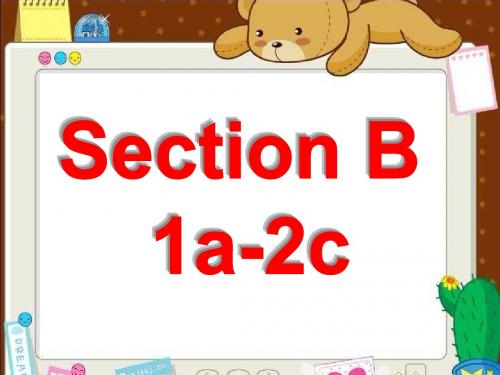
Did you do anything interesting last weekend?
Hi, Alice. What did you do last weekend?
I went to the cinema with my friends.
点此播放对话视频
Hello, Bob. Did you go out last weekend?
Put the phrases in order according 2c to the passage. The use them to retell the story. ___ snake went into the forest ___ put up our tents and cooked food ___ learned a useful lesson ___ saw a snake and shouted to parents for help
其后可以跟一个时间的点;表示“在某 个时间点之前”,但不一定用于一般过 去时态。例如:
我常在七点钟前去上学。
I usually go to school before seven.
此外,before也可以单独用,意为“以
4. What did Lisa and her sister do? They shouted to their parents to let ______________________________ them know the danger. ______________________ 5. What did their father do? Her father jumped up and down in _____________________________ their tent. ____________ Why did he do that? He wanted to wake up the snake. _______________________________
Unit-12-What-did-you-do-last-weekend-大赛课教案
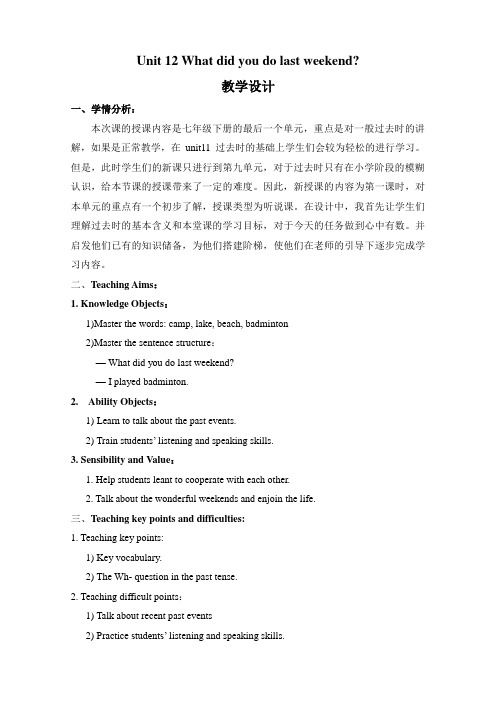
Unit 12 What did you do last weekend?教学设计一、学情分析:本次课的授课内容是七年级下册的最后一个单元,重点是对一般过去时的讲解,如果是正常教学,在unit11过去时的基础上学生们会较为轻松的进行学习。
但是,此时学生们的新课只进行到第九单元,对于过去时只有在小学阶段的模糊认识,给本节课的授课带来了一定的难度。
因此,新授课的内容为第一课时,对本单元的重点有一个初步了解,授课类型为听说课。
在设计中,我首先让学生们理解过去时的基本含义和本堂课的学习目标,对于今天的任务做到心中有数。
并启发他们已有的知识储备,为他们搭建阶梯,使他们在老师的引导下逐步完成学习内容。
二、Teaching Aims:1. Knowledge Objects:1)Master the words: camp, lake, beach, badminton2)Master the sentence structure:— What did you do last weekend?— I played badminton.2. Ability Objects:1) Learn to talk about the past events.2) Train students’ listening and speaking skills.3. Sensibility and Value:1. Help students leant to cooperate with each other.2. Talk about the wonderful weekends and enjoin the life.三、Teaching key points and difficulties:1. Teaching key points:1) Key vocabulary.2) The Wh- question in the past tense.2. Teaching difficult points:1) Talk about recent past events2) Practice students’ listening and speaking skills.四、Teaching ProceduresⅠ. Warming-up1.Show six sentences on the screen with three sentences in simple present tense andthree sentences in simple past tense. Ask students to read them and find the differences between these sentences. Then show the topic.2.Check students if they can change some base form of simple verb into the pastform to lay a foundation for today’s lesson.3.Show studying aims to students and let them know what we will learn today.Ⅱ. Presentation1.Give the students some pictures and learn some new words.1)Show two pictures on the screen. One is about “do one’s homework”and theother is about “play badminton”.2)First, the teacher asks “What do they usually do on weekends?” Students answerthe question as “They do their homework”with the help of the picture. Then change the time. “What did they do last weekend?” Ask students change do to did. And use the full sentence to answer the question.2.Teach other new words and phrases in the same way: want boating; went to thecinema; went to the beach.3.After teaching the words, let students try their best to answer the questions incomplete sentences.4.Revise the key verb phrases. Students can speak out the phrases by seeing theChinese meaning.III. Practice.Task one:Guessing game1. Show the picture that is covered on the screen and let students guess what theperson did last weekend.2. Students can get the clue step by step. If they get the correct answer, they can gettwo points for their group.3. After guessing, read the question and the answer toghter.Task two: Ask and answer1.Show the pictures that we have learned on the screen and ask students thequestion ”What did you do last weekend?” Students should answer the question with these pictures.2.Then let students work in pairs to make a short conversation.--- What did you do last weekend?--- I did my homework on Sunday night.3. A chain-game without repeating.A: What did you do last weekend, B?B: I did my homework. What did you do last weekend, C?C: I … What did you do…, D?D:…IV. Listening and Speaking1. Play the recording the first time. Students listen and underline the words theyhear.2. Play the recording a second time. This time say. Listen to the recording and fill inthe blanks..3. Check the answers. Read the short passage.4. Try to recite the passage with limited words. Try twice with fewer and fewer words.5. According to the example, i t’s students’ turn to tell what they did last weekend. V. HomeworkWrite a short passage about your last weekend?VI. Blackboard Design:。
Unit-12-What-did-you-do-last-weekend知识点总结
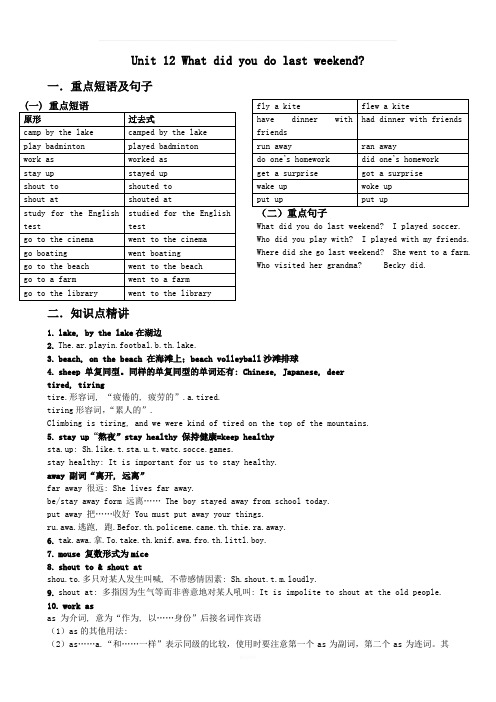
Unit 12 What did you do last weekend? 一.重点短语及句子What did you do last weekend? I played soccer.Who did you play with? I played with my friends.Where did she go last weekend? She went to a farm.Who visited her grandma? Becky did.二.知识点精讲ke, by the lake在湖边ke.3.beach, on the beach 在海滩上;beach volleyball沙滩排球4.sheep 单复同型。
同样的单复同型的单词还有: Chinese, Japanese, deertired, tiringtire.形容词, “疲倦的, 疲劳的”.a.tired.tiring形容词,“累人的”.Climbing is tiring, and we were kind of tired on the top of the mountains.5.stay up “熬夜”stay healthy 保持健康=keep healthysta.up: Sh.like.t.sta.u.t.watc.socce.games.stay healthy: It is important for us to stay healthy.away 副词“离开, 远离”far away 很远: She lives far away.be/stay away form 远离…… The boy stayed away from school today.put away 把……收好 You must put away your things.ru.awa.逃跑, 跑.Befor.th.policeme.came.th.thie.ra.away.6.tak.awa.拿.To.take.th.knif.awa.fro.th.littl.boy.7.mouse 复数形式为mice8.shout to & shout atshou.to.多只对某人发生叫喊, 不带感情因素: Sh.shout.t.m.loudly.9.shout at: 多指因为生气等而非善意地对某人吼叫: It is impolite to shout at the old people.10.work asas 为介词, 意为“作为, 以……身份”后接名词作宾语(1)as的其他用法:(2)as……a.“和……一样”表示同级的比较,使用时要注意第一个as为副词,第二个as为连词。
(完整word版)Unit12Whatdidyoudolastweekend全单元教案

Unit 12 What did you do last weekend?Learning Objectives一、Topics(话题):Weekend activities二、Functions (功能)Talk about past events三、Structures (结构)1. Simple past tense (II)2。
What questions3. Who questions四、Target Language (目标语言)How was your weekend?It was great。
What did you do last weekend?I played soccer。
Who did you play with?I played with my friend.五、Vocabulary (词汇)lake, beach, sheep, kite, moon, snake, forest, surprise, pretty, natural, shout, fly, stay, move, jump, wakecamp by the lake, go to the beach, play badminton, stay up late, fly a kite, get a terrible surprise, shout at/to …, wake … up, put up …, jump up and down六、Skills (技能)Listening for key informationScanning in reading七、Recycling (复习巩固)do homework, go shopping, play computer games, play sports, watch a movie, stay at home, visit friends, study for a test, cook dinner, kind of tiredHow was …? What did you do …? Did you have …?八、教材分析本单元是本册教材的最后一个单元,以复习为主,一方面复习之前学过的很多动词短语,一方面通过以谈论上周末的活动为话题,继续巩固学习一般过去时态的应用。
- 1、下载文档前请自行甄别文档内容的完整性,平台不提供额外的编辑、内容补充、找答案等附加服务。
- 2、"仅部分预览"的文档,不可在线预览部分如存在完整性等问题,可反馈申请退款(可完整预览的文档不适用该条件!)。
- 3、如文档侵犯您的权益,请联系客服反馈,我们会尽快为您处理(人工客服工作时间:9:00-18:30)。
Unit 12 What did you do last weekend?Section A 1 (1a-2d)一、教学目标:1. 语言知识目标:1)掌握以下单词:camp, lake, beach, badminton, sheep, as, natural, butterfly, visitor, tired, stay, stay up late.能掌握以下句型:①— Where did you do last weekend, Lucy?— I went to summer camp.②— How was your weekend?— Pretty good, thanks③I worked as a guide at the Natural History Museum.④ How interesting!2) 能了解以下语法:Learn to talk about recent past events.2. 情感态度价值观目标1. 帮助学生树立合作学习观点。
2. 讲述美好的周末,树立学生享受生活,热爱美好的大自然情感。
二、教学重难点1. 教学重点:1) Key vocabulary.2) Talk about recent past events2. 教学难点:1) Talk about recent past events2) Practice students’ listening, speaking, reading and writing skills.三、教学过程Ⅰ. Warming-upPoint to the previous Saturday and Sunday on a wall calendar, let the students to tell some things they did last weekend,Ⅱ. PresentationGive the students some pictures and learn some new words.III. Work on 1a.1. did my homework __2. went to the cinema __3. went boating __4. camped by the lake __5. went to the beach __6. played badminton __This activity introduces the key vocabulary.1. Focus attention on the picture. Ask students to tell what they see. Name eachactivity and ask students to repeat: did my homework, went to the cinema, went boating, camped by the lake, went to the beach, played badminton.2. Point out the numbered list of activities. Say each one again and ask students torepeat.3. Then ask students to match each activity with one of the pictures. Say, Write theletter of each activity next to the words. Point out the sample answer.4. Check the answers.Ⅲ. ListeningWork on 1b.This activity gives students practice in understanding the target language in spoken conversation.1. Point to the activities in the picture in activity la. Ask students to tell what theperson did in each picture. For example, she played badminton, or Lucy went to the cinema. Play the recording the first time. Students only listen.2. Play the recording a second time. This time say. Listen to the recording and writethe days and times Lucy did each thing under the pictures. Point out the sample answer under the picture of Lucy playing badminton; on Saturday morning.3. Check the answers.4. Listen again and answer the following questions.How was Bob’s weekend?Did Lucy go to the cinema on Sunday?Ⅳ. PairworkWork on 1cThis activity provides guided oral practice using the target language.1. Point to the example conversation. Ask two students to read the dialogue to theclass.2. Say, now work with a partner. Student A, pretend to be Lucy. Student B, askquestions about what Lucy did on different days and times last weekend. Talk about the activities in the picture.3. Students work in pairs. As they talk, move around the room monitoring their work.Offer language or pronunciation support as needed,Ⅴ. ListeningWork on 2a.1. I visited my (aunt / grandma).2. I did my (homework / sports).3. I studied for the (English / math) test.4. I went to a (farm / beach).5. I fed some (sheep / cows).This activity gives students practice in understanding the key vocabulary in spoken conversation.1. Point to the five sentences and ask a student to read these sentences to the class.2. Say, You will hear recording of a conversation. The people will talk about some ofthe activities and people, but they will not talk about others. Please underline the words you hear on the recording.3. Play the recording the first time. Students only listen.4. Play the recording a second time. This time, ask students to underline each wordthat is said on the tape. Point out the sample answer, grandmother.5. Check the answers.Ⅵ. ListeningWork on 2b.Listen again. Write C for Carol, J for Jack or B for Becky next to the statements in 2a.1. ___ I visited my grandma.2. ___ I did my homework.3. ___ I studied for the English test.4. ___ I went to a farm.5. ___ I fed some cows.This activity provides listening practice using the target language.1. Call attention to the pictures of Carol, Becky, and Jack and ask students toidentify each person by name.2. Say, Now I will play the recording again. Listen to the students talking about whatthey did last weekend. Write C for Carol, B for B Becky or J for Jack next to each statement in activity 2a. The first one has been done for you.3. Play the recording the first time. Students only listen.4. Play the recording again. Ask students to write a letter in front of each statementto show what each person did.5. Check the answers.6. Listen again and complete the table.Ⅶ. Pair workWork on 2c.1. Point to the example conversation. Ask two students to read the dialogue to theclass.2. Say, Now work with a partner. Student A, ask questions about what, who or where,Student B answers. Students work in pairs.Ⅷ. Reading1. Learn some new words.2. Ask Ss to look at conversation in 2d. Then Ss read the dialogue by themselves andfind the answer to these questions:1) How was Lisa’s weekend?2) Where did Lisa work as a guide?3) What did she do there?4) Why is Paul tired now?3. Ss work in pairs and role-play the conversations.Paul: Hi, Lisa. How____ your weekend?Lisa: Great. Thanks.Paul: What ____you do?Lisa: I worked ____a guide at the Natural History Museum.Paul: Really? How__________!Lisa: Yeah, it was fun. They have a butterfly house _____ over 200 ______of butterflies! I told the visitors about them and their living habits. Did youhave a good weekend?Paul: Yeah, it was good, but I’m ________tired now. I ________ late to watch the soccer game.IX. Language points1. sheep是名词, 意为“绵羊”。
